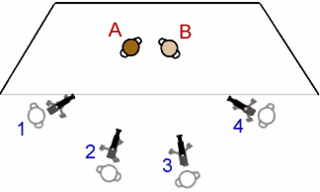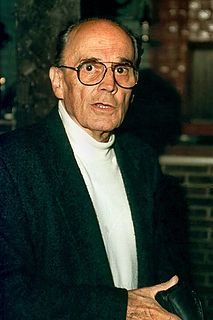
Franka Potente is a German actress and singer. She first appeared in the comedy film After Five in the Forest Primeval (1995), for which she won a Bavarian Film Award for Best Young Actress. Her breakthrough came in 1998, when she portrayed the titular role in the acclaimed action thriller Run Lola Run, for which she won a BAMBI Award for Best Actress. She received further critical acclaim and a Bavarian Television Award nomination for her performance in the television film Opernball.

Praktica is a brand of camera manufactured by Pentacon in Dresden in eastern Germany, formerly within the GDR prior to German reunification in 1990. Pentacon is the modern-day successor to Dresden camera firms such as Zeiss Ikon; for many years Dresden was the world's largest producer of cameras. Currently Praktica is the only brand sold by the company; previous brands of the predecessor firms included Zeiss Ikon, Contax, Ica, Ernemann, Exakta, Praktiflex, Pentacon, and many more.

The Theatre on the Balustrade is situated in Prague, Czech Republic. The theatre was founded in 1958. Its founders - Helena Philipová, Ivan Vyskočil, Jiří Suchý and Vladimír Vodička named their professional theatre after a street leading from the square to the river. Its first production, a musical collage titled If a Thousand Clarinets, was premiered on 9 December 1958. Three months later Ladislav Fialka and his mime group joined the company with their production Pantomime on the Balustrade, and brought back fame to the almost forgotten theatre genre. Drama and mime companies coexisted at the theatre till Fialka's death in 1991.

Ihagee was a camera manufacturer based in Dresden, Germany. Its best-known product was the Exakta single-lens reflex camera.
Edixa is a brand of camera manufacturer Wirgin Kamerawerk which was based in Wiesbaden, West Germany. The product line included several 35mm cameras and 16mm Edixa 16 subminiature cameras designed by Heinz Waaske from the 1950s to the 1970s.

The multiple-camera setup, multiple-camera mode of production, multi-camera or simply multicam is a method of filmmaking and video production. Several cameras - either film or professional video cameras - are employed on the set and simultaneously record or broadcast a scene. It is often contrasted with a single-camera setup, which uses one camera.

Transitional porcelain is Jingdezhen porcelain, manufactured at China’s principle ceramic production area, in the years during and after the transition from Ming to Qing. As with several previous changes of dynasty in China, this was a protracted and painful period of civil war. Though the start date of Qing rule is customarily given as 1644, when the last Ming Emperor hanged himself as the capital fell, the war had really begun in 1618 and Ming resistance continued until 1683. During this period, the Ming system of large-scale manufacturing in the Imperial porcelain factories, with orders and payments coming mainly from the imperial court, finally collapsed, and the officials in charge had to turn themselves from obedient civil servants into businessmen, seeking private customers, including foreign trading companies from Europe, Japanese merchants, and new domestic customers.

Heinz Waaske was a German camera designer, notably father of the Rollei 35.

Wirgin was a German company which is still known for its brands Wirgin and Edixa, and for its camera types like the Edina, the Edinex or the Gewirette. It was based in the Hessian capital Wiesbaden and made a line of quite inexpensive 35mm SLRs from the 1950s to the 1970s, including the Edixa Reflex and Edixa-Mat Reflex. Wirgin was West Germany's main producer of SLRs with focal plane shutter. It also produced some of the lenses for its cameras, among them several M42 screw mount lenses.

The Edixa Reflex cameras, introduced in 1954 were West Germany's most popular own series of SLR's with focal plane shutter. The original name of the first Edixa SLR was Komet. The Wirgin company had to change the name after complaints of two other companies with equally named products. Since 1955 the cameras got additional slow shutter speeds, and since 1956 cameras with aperture release shifter for the M42 lenses were available. Until 1959 four lines of Edixa SLRs were introduced:

Franka Batelić, also known as Franka, is a Croatian singer-songwriter. She rose to fame as the winner of the first season of Showtime. She represented Croatia in the Eurovision Song Contest 2018 with the song "Crazy".
Franka is a Dutch comic book series and strip cartoon.

The Day That Shook the World is a 1975 Czechoslovak-Yugoslav-German co-production film directed by Veljko Bulajić, starring Christopher Plummer and Florinda Bolkan. The film is about the assassination of Archduke Franz Ferdinand and his wife Sophie in Sarajevo in 1914 and the immediate aftermath that led to the outbreak of World War I.

First produced in 1962, the Agfa Optima 1a or Agfamatic was one of the first fully automatic scale-focusing 35mm film cameras. The successor to German camera manufacturer Agfa's Optima 1 camera, the camera employed a selenium cell that generated a voltage related to the luminance, to both measure the light level and to provide the power required for automatic setting of aperture and shutter speed. Other features included a flash mode which overrode the automatic mode to set the camera shutter speed to 1/30s, and a bulb mode for long exposures.
The Netherlands participated in the Eurovision Song Contest 2012 and selected their entry in the national final Nationaal Songfestival 2012; which was organised by the Dutch broadcaster TROS. Joan Franka represented the Netherlands with the song "You and Me", which failed to qualify from the second semi-final, achieving 15th place with 35 points.
Copper is an drama television series created by Tom Fontana and Will Rokos for BBC America. It is set in 1860s New York City, during the American Civil War, and stars Tom Weston-Jones as an Irish immigrant policeman, or "copper", who patrols and resides in the Five Points neighborhood. Other cast members include Kyle Schmid, Ato Essandoh, Anastasia Griffith, and Franka Potente.

The ADOX Polo was a consumer-class, viewfinder camera with a completely manual operating system. It was manufactured between 1960 and 1963 by Dr C. Schleussner Fotowerke GmbH following the company's takeover of the Wirgin camera factory of Wiesbaden, Germany. The brothers who were the founders and original owners of the Wirgin company, fled Germany to avoid persecution from the government of the time.

"You and Me" is a song by singer songwriter Joan Franka. It was chosen to represent the Netherlands in the Eurovision Song Contest 2012. The song was released in the Netherlands as a Digital download on 27 February 2012. Franka wrote and composed the song together with Jessica Hoogenboom.

The Kodak 35 was introduced in 1938 as the first US manufactured 35mm camera from Eastman Kodak Company. It was developed in Rochester, New York when it became likely that imports from the Kodak AG factory in Germany could be disrupted by war.














